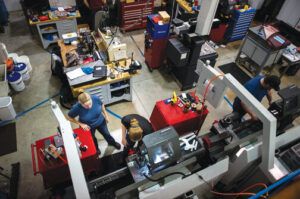
By Diana Setterberg, MSU News Service
Malena Ketelhut remembers the exact moment when, as a child, she decided on the career path that would one day bring her to Gallatin College Montana State University.
“I was in the ‘Alice in Wonderland’ attraction at Disneyland and realized I want to build rollercoasters and design theme parks,” she recalled. “I wanted to say, ‘I built that.’ I want to be part of something that brings people that kind of joy.”
Malena and her family spent the rest of that day absorbed not by the whimsical goings-on down the rabbit hole but instead examining its structure to figure out how Disney managed to bring Lewis Carroll’s story to life.
“It kind of took the magic out of Disney,” admitted Malena’s mother, Bobbie Ketelhut, though she and her husband, an industrial arts teacher at Florence High School, willingly adjusted their plan for the day to indulge their daughter’s curiosity.
Eight years later, the two women share more than the memory of Malena’s epiphanic moment. Both are enrolled in the one-year CNC Machine Technology Certificate of Applied Science program at Gallatin College MSU, where Malena, now 18, keeps her career goal in mind every day.
“This is a good step in that direction,” she said.
CNC stands for computerized numerical control, a system by which manufacturing machines are programmed to “make everything,” said Gallatin’s CNC Program Director Aubrin Heinrichs.
“You take a block and apply tools and knowledge to make it into something worth hundreds, even thousands – jewelry, components, toys or brakes on your car,” he said. “It’s taking an engineer’s idea and making it real.”
Bobbie, 46, a former insurance adjuster, became interested in learning CNC machining after seeing another school’s machining program during a field trip. She and Malena were equally enthused to sign up, and when that particular program was put on hiatus, the Ketelhuts turned to Gallatin College MSU, which offered the best program for their needs.
While attending classes in Bozeman, the two of them share an apartment in the city, then commute home to the Bitterroot Valley each weekend.
“There are cheaper places to get an apartment that are closer to Florence, but it’s worth it to be at this school,” Bobbie said.
The Ketelhuts said Heinrichs and the other Gallatin College MSU instructors really know the field, which earned their respect. Plus, their lessons emphasize how machining touches every part of modern life.
“They’ve lived what they’re trying to tell us,” Malena said. “They’re trying their best to make sure we’re going to be good machinists.”
“Without machining, we’d be back to dipping feathers in inkwells,” agreed Bobbie, who uses her new skills working nights for Spark R&D, a Bozeman manufacturer of backcountry snowboard bindings. “Machining touches every part of the bindings. The metal parts are milled, the plastics are injection-molded and anodizing equipment colors the metal parts.”
Heinrichs said machinists are in demand locally and nationwide and that employment opportunities abound for Gallatin College MSU graduates. He added that stereotypes of machine shops filled with grease-stained workers are outdated.

“The machining field has changed dramatically in the last 15 years due to advancements in computer technology and the scale and scope of applications in manufacturing,” he said. “It’s opened the door to a new breed of machinists who are looking at working as technicians, not just turning wrenches and handles.”
To that end, he said, his students must think like engineers. They begin programming and running machines on the first day of class, then learn how to overcome unanticipated obstacles through hands-on projects.
The Ketelhuts said the curriculum is as challenging as it is stimulating. Advanced trigonometry has been the most difficult element for them so far, but mastering it is necessary because precision down to thousandths of an inch is essential in machining. And a focus on details isn’t the only trait required for the job, they’ve learned.
“You’ve got to be calm,” Malena said. “Machines don’t like being yelled at and they don’t respond. You have to have patience and the ability to keep going.”
Bobbie said she may pursue a teaching certificate after completing the program because she enjoys sharing what she has learned with her husband’s industrial arts students. She and Malena take the “flubbed-up” parts they’ve made in Bozeman home to Florence each weekend so another generation of students can learn from them.
Malena, still pursuing her ultimate goal of designing theme parks, knows that if the road takes a few unexpected twists and turns along the way, the machining skills she graduates with will be marketable anywhere.
“I could potentially be part of the process that impacts everybody on Earth – the entire world revolves around machining,” she said. “It’s powerful being part of that.”